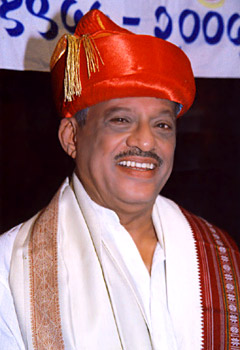 Ratnakar Matkari was a prolific Marathi author who experimented with many genres like the short story, novel, essay, and newspaper column, apart from drama. Ratnakar Matkari was born in 1938. He began his career with one-act and radio drama. After that he shifted to Childrens theatre where he made a special contribution with thirteen plays. Many of these plays he directed himself for Balnatya. This is the group that he runs with his wife Pratibha. Variety in form and content characterized these scripts. These were a trait that he carried to his adult corpus as well. The use of suggestive sets and props instead of heavy realistic decor, and social themes instead of fairy tales, set them apart from the usual Marathi children`s theatre. Nimma shimma rakshas i.e. `Half-and- half Demon` in 1963, Acbat gavchi afat mavshi i.e. `Wacky Aunt of Tacky Village` in 1966, and Butbaingan i.e. `Tiny Tot` in 1984 are his best-known children`s plays.
Ratnakar Matkari was a prolific Marathi author who experimented with many genres like the short story, novel, essay, and newspaper column, apart from drama. Ratnakar Matkari was born in 1938. He began his career with one-act and radio drama. After that he shifted to Childrens theatre where he made a special contribution with thirteen plays. Many of these plays he directed himself for Balnatya. This is the group that he runs with his wife Pratibha. Variety in form and content characterized these scripts. These were a trait that he carried to his adult corpus as well. The use of suggestive sets and props instead of heavy realistic decor, and social themes instead of fairy tales, set them apart from the usual Marathi children`s theatre. Nimma shimma rakshas i.e. `Half-and- half Demon` in 1963, Acbat gavchi afat mavshi i.e. `Wacky Aunt of Tacky Village` in 1966, and Butbaingan i.e. `Tiny Tot` in 1984 are his best-known children`s plays.
The most important of his plays for adults was Aranyak i.e. `Book of the Forest` in 1974 presenting the post-war period in the Mahabharata with the texture of Greek tragedy. Other can be mentioned as Lokkatha 78 i.e. `Folk Tale 78. This was directed by him in 1978 exploring for the first time Dalits` problems in a flexible, improvised, non-naturalistic form mark a phase of experimentation and vibrant contribution to Marathi theatre. In the late 1970s he left his bank job and turned professional for mainstream theatre. The biographical Dubhang i.e. `The Split One` in 1981 on P. K. Atre, the light comedy of Chi San Ka Champa Govekar i.e. `Soon-to-be-Wed Champa Govekar` in 1981, the problem play Majha kai chukla? i.e. `What Was My Mistake?` in 1981, the psychological terror of Kholkholpani i.e. `Deep Waters` in 1983, and the musical Tumche amche gane i.e. `Your Song and Mine` in 1985 are major works among thirty-two full-length plays for the commercial theatre.
Ratnakar Matkari had immense variety in theme, form, and use of language makes it difficult to pinpoint a Matkarian style. One can identify a Matkarian play by its taut structure and fine dramatic technique. Matkari has directed for both the mainstream and parallel theatres, acted occasionally, written for television and cinema, illustrated his book covers, and sketched his characters for the printed texts. Some of his plays, like Lokkatha 78, have been performed in several Indian languages. This famous personality has won several awards. He has so far received 21 awards from many institutions. Most recently he has won the Sangeet Natak Akademi Award. Some of the achieved awards can be named as follows.
Ratnakar Matkari got Dadasaheb Phalke Award in 1986 for the script writing of the film `Maaze ghar, Maaza sansar`. He was awarded Jyotsna Bhole Award of Akhil Bharatiya Natya Parishad in 1978 for his work for Children-stage. `Natya-darpan` Nana Oak Award for being an all-round artist. He was also awarded Deval Award from Akhil Bharatiya Natya Parishad in 1985. The best drama-writer Award from Atre Foundation in 1985. He was awarded Maharashtra State Govt.`s Gadkari Award in 1995 for being the top-most drama writer. In 1997 he got Gangadhar Gadgil Award, in 1998 he got S.L.Gadre Matoshri Award. In 1999 he got `Natyavrati` Award, V.V.Shirwadkar Award for drama writing in 2002. The greatest Sangeet Natak Akademi Award was achieved in 2003-04.




















